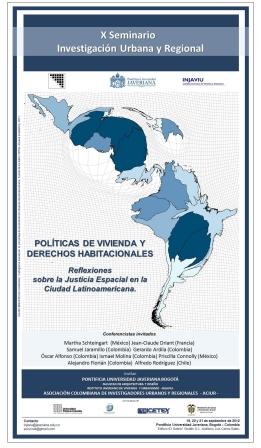Abstract
En el año 2011 la Universidad de los Andes decide formular el Plan Parcial del Triángulo de Fenicia en el marco del Programa Progresa Fenicia, iniciativa que busca la transformación urbana y social del sector apostando a una renovación incluyente y justa, en donde la participación de la comunidad es un eje fundamental. En el contexto definido por el Programa, el Departamento de Arquitectura ha sido el responsable de desarrollar los talleres de participación para la construcción de un modelo urbano participativo, cuyo alcance consiste en identificar propuestas de transformación desde la mirada de la comunidad, para que hagan parte de los insumos de trabajo de los arquitectos responsables de desarrollar el modelo urbano del Plan Parcial. En este documento se describe el proceso que formulación de los talleres, su puesta en práctica y los resultados obtenidos, así como las conclusiones de esta experiencia que espera seguir madurando y fortaleciéndose.
This journal is registered under a Creative Commons Attribution 4.0 International Public License. Thus, this work may be reproduced, distributed, and publicly shared in digital format, as long as the names of the authors and Pontificia Universidad Javeriana are acknowledged. Others are allowed to quote, adapt, transform, auto-archive, republish, and create based on this material, for any purpose (even commercial ones), provided the authorship is duly acknowledged, a link to the original work is provided, and it is specified if changes have been made. Pontificia Universidad Javeriana does not hold the rights of published works and the authors are solely responsible for the contents of their works; they keep the moral, intellectual, privacy, and publicity rights.
Approving the intervention of the work (review, copy-editing, translation, layout) and the following outreach, are granted through an use license and not through an assignment of rights. This means the journal and Pontificia Universidad Javeriana cannot be held responsible for any ethical malpractice by the authors. As a consequence of the protection granted by the use license, the journal is not required to publish recantations or modify information already published, unless the errata stems from the editorial management process. Publishing contents in this journal does not generate royalties for contributors.


